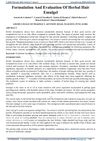 October 2018 in “InTech eBooks”
October 2018 in “InTech eBooks” The most effective treatments for hair loss are minoxidil, finasteride, PRP, and hair transplants, with steroids and immunosuppressants for autoimmune types.
 November 2020 in “Postepy Dermatologii I Alergologii”
November 2020 in “Postepy Dermatologii I Alergologii” Sulfotransferase SULT1A1 activity may predict minoxidil treatment success for hair loss.
 1 citations,
January 2017 in “Elsevier eBooks”
1 citations,
January 2017 in “Elsevier eBooks” The document concludes that new treatments for hair loss may involve a combination of cosmetics, clinical methods, and genetic approaches.
 15 citations,
May 2004 in “Facial Plastic Surgery Clinics of North America”
15 citations,
May 2004 in “Facial Plastic Surgery Clinics of North America” Treat pattern hair loss with finasteride and topical minoxidil.
 9 citations,
January 1997 in “Gynecological Endocrinology”
9 citations,
January 1997 in “Gynecological Endocrinology” The document concludes that treating androgen excess needs patience, managing expectations is important, and many drugs used are not officially approved, suggesting cosmetic options for mild cases.
 December 2013 in “Biomedical and biopharmaceutical research”
December 2013 in “Biomedical and biopharmaceutical research” Nanotechnology shows promise for better drug delivery and cancer treatment.
 77 citations,
March 2001 in “Clinics in Dermatology”
77 citations,
March 2001 in “Clinics in Dermatology” Androgenetic alopecia involves genetics, hormones, and can be treated with medications or surgery.
 17 citations,
January 1995 in “The American Journal of Medicine”
17 citations,
January 1995 in “The American Journal of Medicine” The document concludes that proper diagnosis and tailored long-term treatment can effectively manage androgenic disorders in women, improving patient care outcomes.
 50 citations,
January 2007 in “PubMed”
50 citations,
January 2007 in “PubMed” Minoxidil 2% and 5% are common treatments for female pattern hair loss, with other options including anti-androgens, oral contraceptives, and hair transplantation.
March 2023 in “Anais Brasileiros De Dermatologia” Topical minoxidil is the best-supported treatment for female hair loss, but personalized plans are needed.
 8 citations,
May 2017 in “Current traditional medicine”
8 citations,
May 2017 in “Current traditional medicine” Stinging nettle has compounds that help with joint pain, arthritis, and prostate issues.
 17 citations,
August 2015 in “Expert Opinion on Pharmacotherapy”
17 citations,
August 2015 in “Expert Opinion on Pharmacotherapy” The document concludes that oral finasteride and topical minoxidil are effective for genetic hair loss, while other treatments for different types of hair loss show promise but need more research.
 81 citations,
March 2009 in “Seminars in Cutaneous Medicine and Surgery”
81 citations,
March 2009 in “Seminars in Cutaneous Medicine and Surgery” Effective hair loss treatment in women requires correct diagnosis and can include medications like minoxidil, antiandrogens, and treatments for underlying conditions like PCOS.
 25 citations,
November 2015 in “Journal of Ethnopharmacology”
25 citations,
November 2015 in “Journal of Ethnopharmacology” Certain Chinese herbs, especially Cacumen platycladi, can promote hair regrowth and reduce hair loss-related hormone levels in mice.
August 2024 in “Pharmaceuticals” Oral sturgeon oil promotes hair growth and improves gut health.
July 2024 in “Actas Dermo-Sifiliográficas” Finasteride and dutasteride do not significantly change beard thickness in men.
 7 citations,
June 2021 in “Trends in Food Science and Technology”
7 citations,
June 2021 in “Trends in Food Science and Technology” Western diet may cause male pattern baldness; low glycemic diet with magnesium could help.
 4 citations,
November 2020 in “Journal of Cosmetic Dermatology”
4 citations,
November 2020 in “Journal of Cosmetic Dermatology” Most Facebook posts about hair loss treatments are promotional and not medically supported, with better quality information found on YouTube.
 29 citations,
July 2009 in “BJU international”
29 citations,
July 2009 in “BJU international” Blocking DHT production more strongly may help control advanced prostate cancer and improve quality of life.
 July 2012 in “The Journal of Urology”
July 2012 in “The Journal of Urology” Testosterone increases muscle mass regardless of DHT conversion blocking.
 2 citations,
December 2003
2 citations,
December 2003 Saw palmetto is an effective natural treatment for hair loss with minimal side effects.
10 citations,
February 2017 in “European journal of neuroscience/EJN. European journal of neuroscience” The availability of certain hormones and specific stimulation patterns affect long-term synaptic changes in the male rat brain.

Minoxidil helps stimulate hair growth and enlarge small follicles in common hair loss, but doesn't stop it, and its effects can be boosted when combined with finasteride.
August 2021 in “Journal of The American Academy of Dermatology” Finasteride treatment changes hormone levels in male pattern baldness patients.
 1 citations,
October 2023 in “International journal of Ayurveda and pharma research”
1 citations,
October 2023 in “International journal of Ayurveda and pharma research” Herbal medications might be safer and more effective for hair loss than synthetic treatments.
 5 citations,
December 1979 in “Clinical and Experimental Dermatology”
5 citations,
December 1979 in “Clinical and Experimental Dermatology” Anti-androgens are effective for female acne but less so for male-pattern hair loss, with side effects similar to birth control pills.
 7 citations,
August 2021 in “Heliyon”
7 citations,
August 2021 in “Heliyon” Phyllotex™ extract was found to significantly promote hair growth and protect against hair loss.
 February 2020 in “Journal of emerging technologies and innovative research”
February 2020 in “Journal of emerging technologies and innovative research” The herbal hair emulgel was effective and stable for promoting hair growth, reducing dandruff, controlling hair fall, and preventing greying.
 54 citations,
February 1993 in “Endocrine reviews”
54 citations,
February 1993 in “Endocrine reviews” Androgen conjugates might be better indicators of skin sensitivity to hormones in women with excessive hair growth.
3 citations,
January 2022 in “Journal of neuroendocrinology” Sex hormones affect brain cells differently in males and females.
























